SELECTED WORKS
 Fernando Julian Buraggi Architect
Fernando Julian Buraggi Architect




 Fernando Julian Buraggi Architect
Fernando Julian Buraggi Architect



L+ Partners | Milan - Italy | FEB 2023 - PRESENT
_Focus on high-standard healthcare building design from Concept phase to Construction Documents in BIM environment.
_Assisted senior architects to coordinate multiple projects with structures and MEP consultants.
_Prepared architectural visualizations finalized to communicate with clients and local authorities.
Freelance | JAN 2021 - PRESENT
_BIM modeling of small-scale projects finalized to managing economic data.
_Created visualizations of small-scale projects for private clients.
Atelier Verticale | Milan - Italy | APR 2021 - GEN 2023
_Developed large-scale projects of international renowed firms in Design Development and Construction Documents phases in BIM environment.
_Supported all designing phases in compliance with Italian law for international renowed firms in local projects.
_Drafted building permits of small and medium-scale projects and presentations for local authorities.
_Coped with communication between consultants to coordinate structures and MEP disciplines.
Studio MiAA | Olbia - Italy, JUNE 2018 - SEPT 2018 | JAN 2021 - MAR 2021
_Participated in designing processes, survey and digital drawing of existing buildings.
_Addressed renovation projects of local offices and apartments.
Andrés Perea Arquitecto | Madrid - Spain | OCT 2017 - FEB 2018
_Enhanced the visual communication of drawings for the competition’s deliveries. _Participated to international competitions in Concept and Schematic phases.
Politecnico di Milano | SEPT 2018 - DEC 2020
Thesis focused on the development of a High-Rise building in Milan with a complementary approach towards architecture, structure, systems, sustainability and BIM environment.
_Graduated with full marks.
UIC Universitat Internacional de Catalunya Barcelona | SEPT 2019 - JAN 2020
_First prize in a interior competion for concept development of new concrete technologies for human settlements in extreme environments.
Università IUAV di Venezia | OCT 2014 - MAR 2018
_Speciality in designing with buiilt heritage.
- Summer workshops wih international renowed architects.
- Graduated with full marks.
Partnership with Cemex | Biel, Switzerland | JAN 2020
_Concept development of new uses of high-tech concrete for human settlements in extreme environments.
W.A.VE. 2017 - SYRIA: THE MAKING OF THE FUTURE
with arch. Sinan Hassan (Syria) | Venice, Italy | JUN - JULY 2017
_Developed concepts for a new hypogeum citiy in Palmyra in post-terroriits attacks.
W.A.VE. 2016 - PORTO MARGHERA: CROSSING BORDERS
with arch. Guilhelme Machado Vaz (Portugal) | Venice, Italy | JUN - JULY 2016
_Planned urban strategies to rethink the industrial port areas of Venice.
AUTODESK AUTOCAD




HIGHLY PROFICIENT
AUTODESK REVIT

HIGHLY PROFICIENT
RHINOCEROS
INTERMEDIATE
SUITE OFFICE
PROFICIENT
ADOBE PHOTOSHOP

HIGHLY PROFICIENT
ADOBE ILLUSTRATOR
PROFICIENT
ADOBE INDESIGN


HIGHLY PROFICIENT
ENSCAPE
HIGHLY PROFICIENT

Located between the marvellous Dolomites in Cortina d’Ampezzo, (Italy) the Hotel Cristallo will undergo a significant 30,000 m3 extension and refurbishment, in order to further raise its quality standards. The historic palace will be completed with a contemporary yet respectful architecture designed by Herzog & De Meuron. As local architect and construction supervisor, Atelier Verticale managed the executive design and the permitting process.

• BIM development from Schematic Phase to Construction Documents
• BIM modeling in compliance with Italian regulations
• Presentations prep for local authorities finalized to project approval
• Drafting of Design Development and Construction Documents drawings
• Drafting of reports to enhance interdisciplinary coordination (architecture, structures and MEP)
© Herzog & De Meuron



Cirywave is a 53.000 m2 development with workspaces and public amenities, designed on the last two remaining plots of the Citylife masterplan in Milan. The characteristic long portico is clad entirely in PV tiles, forming one of the larget rooftop solar installations in Europe and it embraces the surrounding public space. As local architect and construction supervisor, Atelier Verticale managed the executive design and the permitting process.
• BIM modeling in compliance with Italian regulations
• Drafting of Construction Documents drawings
• Drafting of reports to enhance interdisciplinary coordination (architecture, structures and MEP)
The following images show a selection of small-scale projects in which I was involved as visualizer and BIM consultant. The sites are:

North Downs, UK
Langley Court, UK
Olbia, Italy
• BIM consulting
• 3D modeling
• Texture set-up
• VIsualization
• Post-production


North Downs_Surrey_UK
Private client
Team: Fernando J. Buraggi


Yatch club Olbia
Team: Fernando J. Buraggi


Aimed at strengthening the urban transformation taking place in the Porta Nuova district, the thesis addresses the international design competition for Pirelli 39 launched by COIMA. Pirelli 35 Competition site has been also involved to frame the new intervention within a wider urban design proposition: a new urban structure characterized by “suspended volumes” generate a system of public spaces on various levels across the new complex, from the city ground to panoramic sky-terraces. The strong potential of the area required its complete urban redevelopment and the repositioning of the existing buildings, as well as direct relations with the planned future interventions, such as towers “Gioia 20”, and the reopening project of the Naviglio Martesana. Through two squares, located at the same level as the Naviglio Boulevard, two assertive architectures - a highrise and a low-rise building- are grafted into the site to form a new entrance to Porta Nuova, facing the “Gioia 20” twin buildings.
Standing on the edge of the “Library of the Trees” Park, the “horizontal” volume delimits it by opening a large lowered square towards Via Bordoni and Via Pirelli with the aim of mending up the undeveloped parts of the neighbourhood. Iconic and incisive, the tower rises on the corner of the Park,
developing new public spaces at high altitude. The new open spaces disclose a hierarchical organization of functions according to their accessibility to the public, characterizing the low-rise building as a volume completely “open” to the city, and allowing for progressive privatization on the powerful vertical volume.
Both buildings exploit a structural steel structure with prefabricated elements technology that enhances the concept of suspension also along the vertical development of the tower. The internal skeleton, occasionally revealed to emphasize its structural effectiveness, also gives a visually industrial character to the buildings. The envelope is completed by a highly performing modular curtain wall, on which shading systems are set up to distinguish each of the two volumes. The horizontal volume is wrapped in a perforated corrugated sheet, which reveals the strong reticular structure; while the tower is characterized by vertical aluminium brise-soleils that mark the rhythm of the facade, communicating the progressive internal privatization.
The result is a “bilateral” architectural proposal based on structural experimentation, which creates a new “gate” for the neighbourhood and synthesize a more inclusive urban scenario available to all social strata.
Politecnico di Milano_Master Degree Thesis Project 2020

Team : Fernando J. Buraggi, Danyal Zarepourmoghaddam
Mixed-use
FULL THESIS PROJECT HERE: Panels | Book
Total area: 28450 m2
Housing: 7620 m2
Offices: 7470 m2

Leisure: 2550 m2
Retail: 5740 m2
Fitness: 670 m2
Housing facilities: 670 m2
Underground: 2630 m2
Atrium: 1100 m2
Total area: 28120 m2
Cultural: 2215 m2
Coworking: 2875 m2
Auditorium: 2050 m2
Atrium: 1380 m2
Exhibition: 900 m2
Retail: 10750 m2
Leisure: 7950 m2
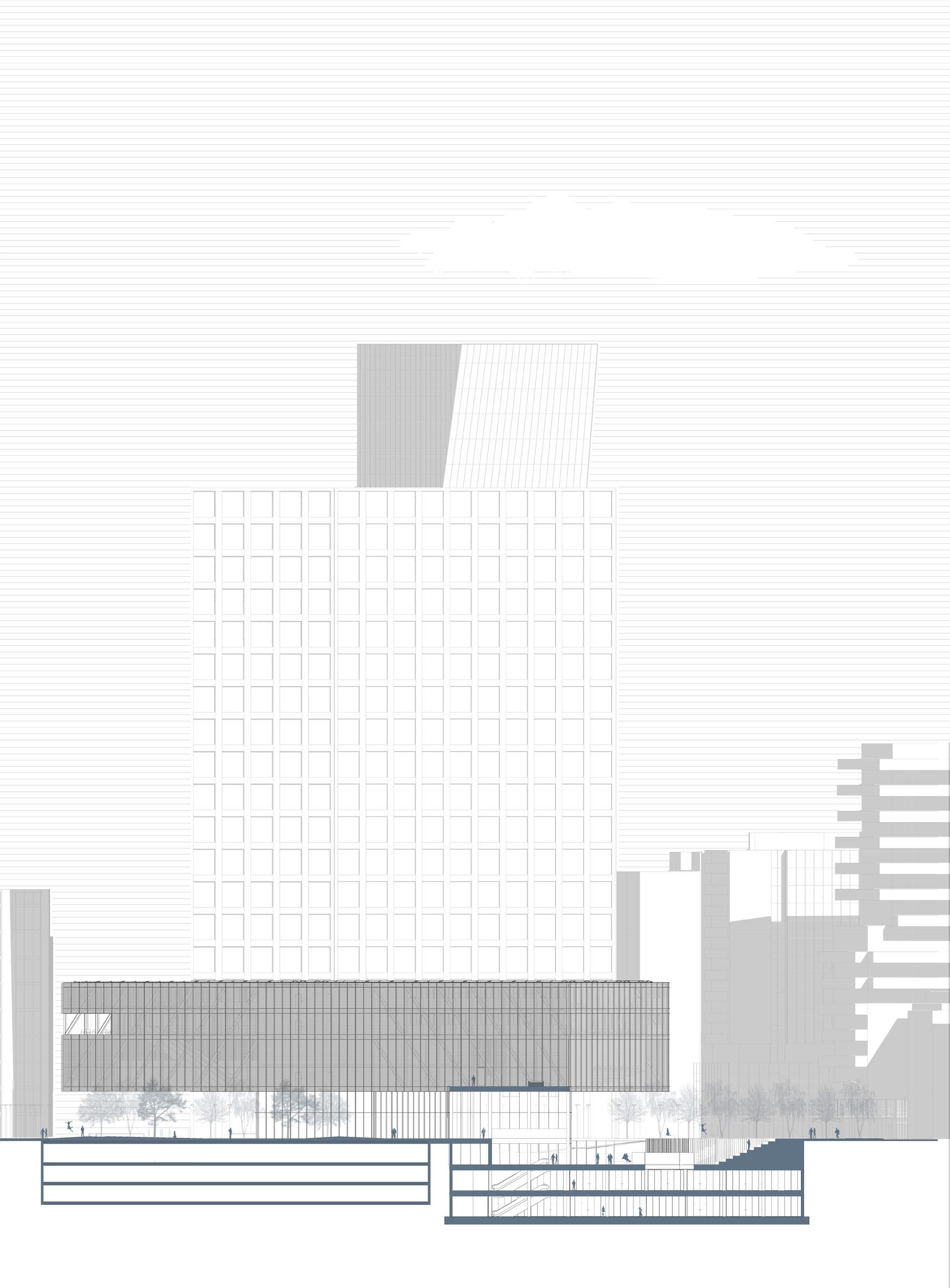

Where architecture and structure blend together

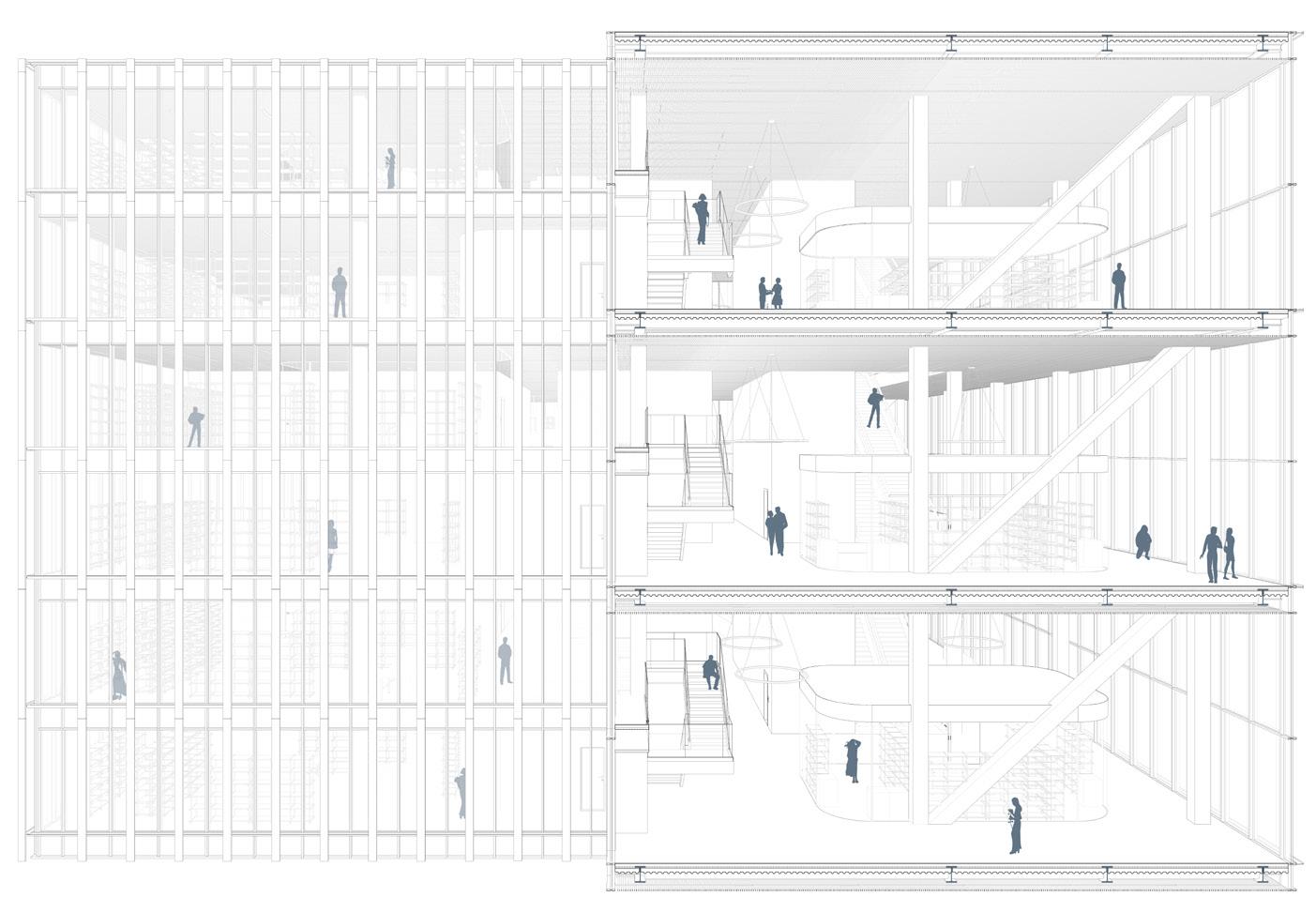






It is well known that Barcelona is a popular tourist destination. Its architectural heritage, climate and seaside make it one of the most internationally renowned cities. What is not commonly known, however, is its predominant role in the country’s industry. Textiles, logistics, electronics, automotive are some of the sectors in which the city excels. One of the districts in which the productive fabric is still strongly present is the Bom Pastor, located northeast of the city center and it represents the project site for this theme developed during the Erasmus experience at UIC. Students were asked to draw up a common masterplan for each group, with the aim of revitalizing the urban context of Bom Pastor, currently in a situation somewhere between the degradation of the present industrial buildings and the active life of a residential neighborhood, and to individually develop an architectural project that included a program indicated for the chosen recovery strategy, with an eye towards the themes concerning the Industry 4.0. The master plan aims to build a new urban front for the neighborhood, by filling unused land with four projects
with common factors: a sequence of outdoor spaces facing the same axis intended for logistic functions, a mixed-use program, simple volumes that reflect the typologies present in the context.
The C.H.H. (Craft and Housing Hub) project proposes a volumetric system originated by the sequence of full and empty spaces originated by the existing urban fabric, culminating with the emergence of a 60-meter tower that imposes itself on the surrounding skyline as a beacon of the new industrialization in progress. To underline its industrial character, a steel super-structure wraps the building, allowing also a system of external good lifts to move easily in altitude. Internally, mainly productive functions are housed together with residential and commercial functions, thus promoting a cooperative system in which the craftsman lives, works, sells and receives the necessary materials in the same place. From here the idea of proposing a new type of house-workshop in which, in addition to the traditional residence, the craftsman has a work area in his own residence.
Bon Pastor, Barcelona, Spain
Universitat Internacional de Catalunya_Design Studio 2019

Team: Fernando J. Buraggi
Mixed-use

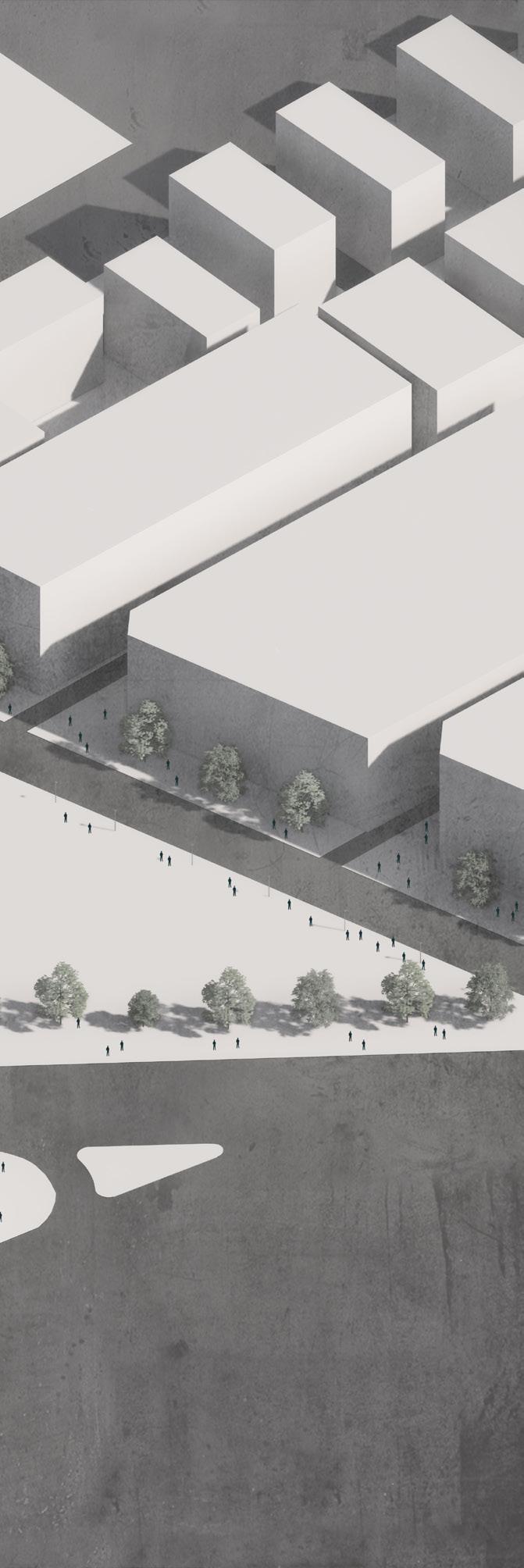


The twenty-first century represents an era marked by fragmentation, the continuous evolution of technology and, consequently, of society. The individual therefore finds himself in a dimension in which he has few certainties, and whoever seeks refuge from the frenetic pace of contemporary life seeks above all calm, safety, immobility. Spirituality and religion have the role of offering this kind of refuge to the individual, and the architecture through which the individual comes into contact with his or her spirit plays an important role in the process. The ambitious starting point of the project envisions an architecture that brings together the three major religions into one space, while maintaining its independence for conventional celebrations.
The project site is located in Porta Romana, in a green space between via Monte Nero and viale Caldara where the city activity is not aggressive, yet solid. Moreover, the presence of
a surviving fragment of the ancient Spanish city walls enriches the context of the project and is adopted as a generating element. The existing urban void is filled with four volumes, juxtaposed and arranged to allow an easy and immediate exchange of flows. They are composed of a binomial shell-core in which the shell, through its shape, represents the archetype of the house that is synonymous of shelter, yet remains a cold environment without barriers from the material world. The actual transition to the spiritual sphere of the individual occurs upon accessing the core, the warm and safe environment where he or she can gather with other believers, pray and find salvation. The footprint of each core recalls the belonging to one’s own religion, while the Common Space to all three religions is generated and characterized by the fragment of the Spanish walls, witness to the founding element of the three religions, the Time.
Politecnico di Milano_Design Studio 2019
Team: Natalia Okaliova_Fernando J. Buraggi



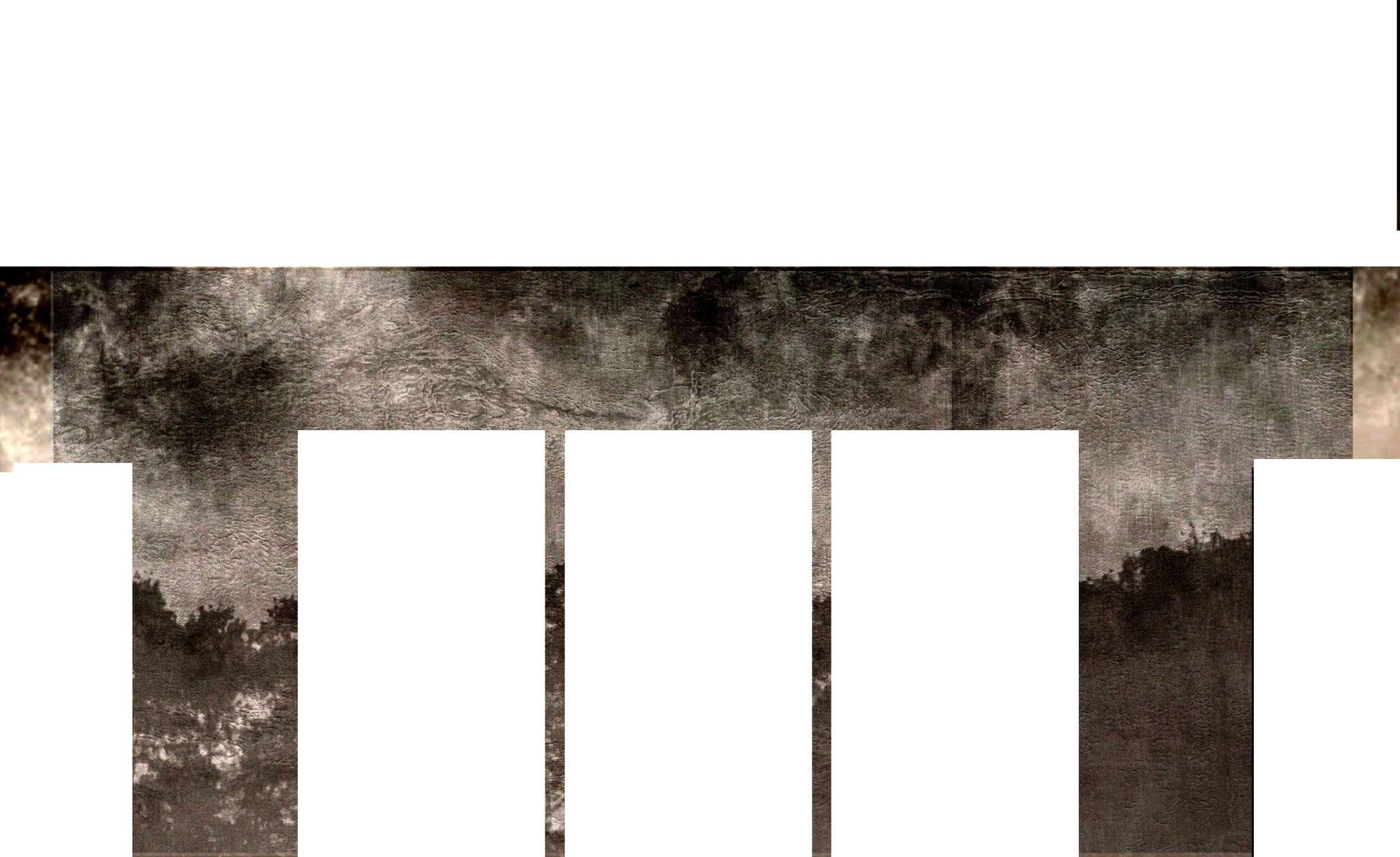
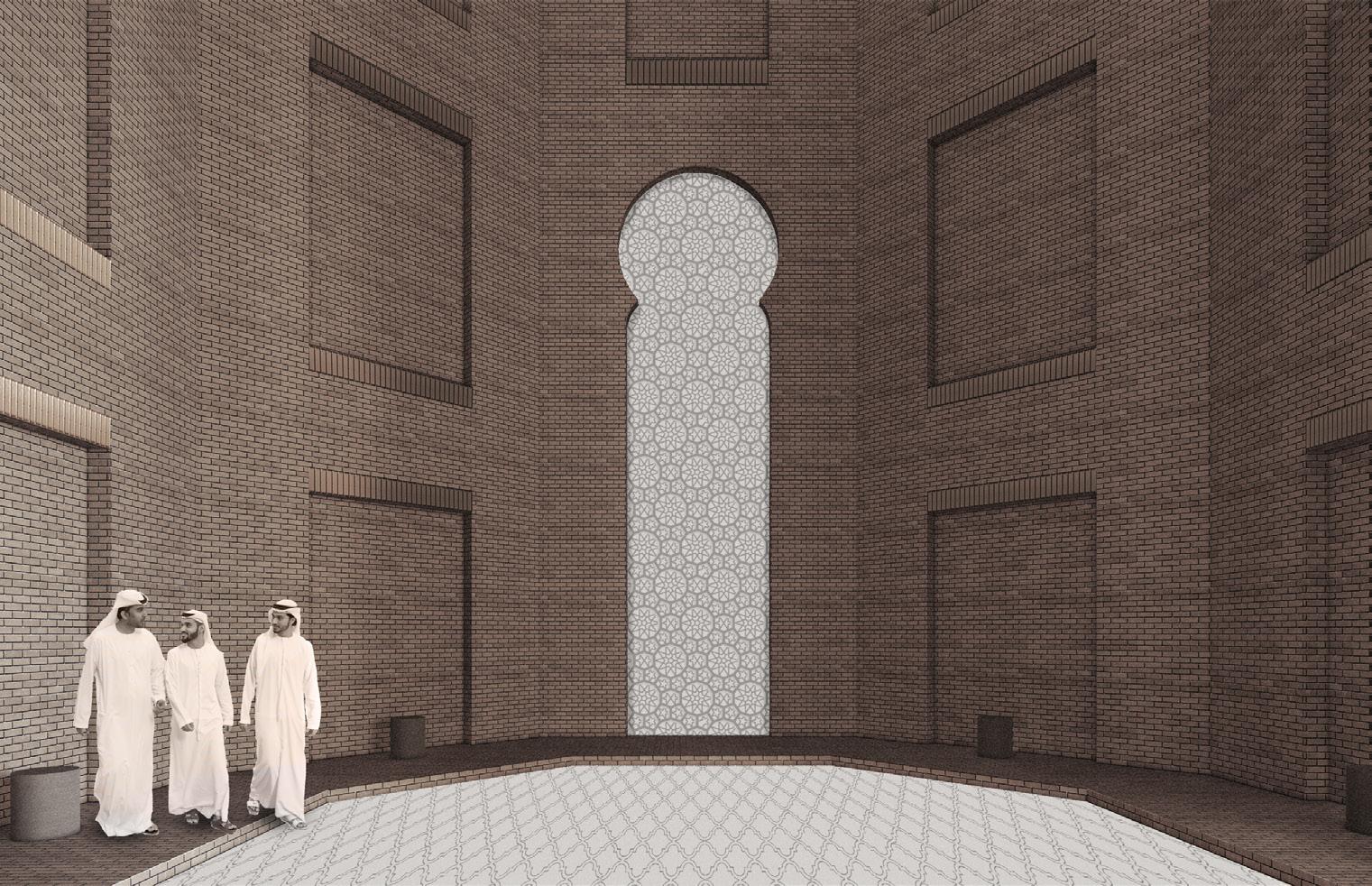


A transition from the physical world to the spiritual dimension

The project subject is a shelter located on the Puigmal d’Er, a mountain situated in the Pyrenees on the border between Spain and France. The altitude is about 2500 meters and the context is bare and hostile. On the slopes of the Puigmal there are hiking trails widely used by sportsmen, and the purpose of the Building Construction Studio is to design an architecture suitable to accommodate the walkers of the trails and that is mainly made of dry construction technologies. The advantages of this choice range from ease of assembly, disassembly and transport to the sustainability of the materials used and minimal interventions on the topography of the context.
Starting from a compact and simple volume to optimize the management of
snow and air currents, the structural skeleton is made out of timber The cladding, on the other hand, is designed as a metal skin of zinc with an open joint, allowing the flowing of water over the underlying waterproofing and be channelled into the downpipes hidden under the cladding itself. In order to minimize ground movement and avoid casting concrete for the foundations, the shelter is anchored to the ground by means of metal pillars fixed to gabions filled with stones, collected from the site itself and joined together by mortar castings. If the architecture has to be removed from the site, the stones in the gabions will be crushed and returned to the ground.
Puigmal d’Er_Catalunya_Spain
Politecnico di Milano_Construction Studio 2019
Team: Fernando J. Buraggi

1 Scots pine ridge batten profile 7 x 4 cm
2 Ridge cap in zinc 1 mm
3 Façade panel VM ZINC with open joint 1 mm
4 Solar panel integrated into the roof 170 x 100 x 5 cm
5 Ridge beam in laminated wood profile 20 x 30 cm
6 Pillar in Scots pine profile 30 x 20 cm
7 Laminated beam profile 20 x 30 cm
8 Supporting strip to cladding in Scots pine profile 7 x 7 cm glued to the support strip with SIKA-TAK silicone.
9 Asphalt waterproofing membrane bonded and glued to support strip with SIKA-TAK silicone
10 Supporting board 2 cm
11 6 x 12 cm profile batten

12 Sheep wool thermal insulation 24 cm
13 Inner lining board in beech 2 cm
14 Stainless steel L-shaped drainage channel 1mm thick
15 Double-layer glass/wooden carpentry enclosure
16 Flooring in Scots pine boards, profile 5 x 30 cm
17 CLT floor slab 5 layers 15 cm
18 Wooden profile 10 x 10 cm
19 Flooring in Scots pine planks profile 5 x 30 cm
20
Laminated wood joists profile 15 x 15 cm
21 Sheep wool insulation 12 cm
22 Triple layered CLT slab 18 cm
23 Hot-dip galvanized steel plate 460 x 460 x 50 mm
24 Hot-dip galvanized steel tubular pillar d = 260 mm
25 Hot-dip galvanized steel plate 660 x 660 x 50 mm
26 Stone gabion glued with mortar 100 x 100 cm
archfburaggi@gmail.com
+39 340 10 38 267



fernando julian buraggi
fernando julian buraggi
Apart from where otherwise indicated, all images, drawings and renderings were produced and edited by myself and teammates. No copyright infringment in the production of this portfolio.

